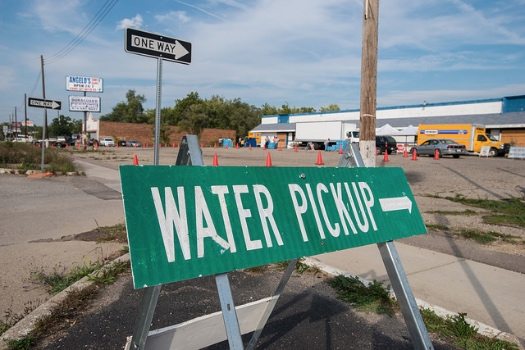
May 4, 2017; Washington Post
NPQ has closely followed the difficulties of Flint, Michigan, and its lead-contaminated water. Since 2015, when researchers at Virginia Tech University found unsafe levels of lead in children’s blood samples, the city has struggled both to provide safe water and to regain residents’ trust.
The city has resumed buying water from Detroit instead of pumping it from the polluted Flint River. According to the Michigan Department of Environmental Quality last month, the water now tests “below action levels of the federal Lead and Copper Rule and at levels comparable to cities with similar size and age of infrastructure in Michigan and across the nation.”
The water coming from Detroit may be safe, at least according to federal guidelines, but thanks to old, lead-based pipes in Flint’s water system, it’s still not safe to drink, , according to advocates posting to the website FlintWaterStudy.com. Several nonprofits, the federal government, and the state have kicked in money to replace pipes, but of the 20,000 that need replacing, the city will only get to 6,000 this year.
Faulty pipes did not stop the cash-strapped city of Flint from billing residents for the water, however. This week, over 8,000 Flint residents received letters in the mail, telling them that their water bills were past due. According to the New York Times, “If homeowners do not pay by May 19th, property liens are transferred to tax bills, which begins a process that can end with residents losing their homes unless they pay their outstanding bills before March 2018.”
A municipal foreclosure differs from a mortgage foreclosure in terms of the cause of forfeiture and the beneficiaries. In municipal foreclosure, which is the type initiated by unpaid property taxes or, in this case, municipal bills, “Parcels are forfeited to the county treasurers when the real property taxes are in the second year of delinquency,” according to the state treasury. In Flint, the state acts as the foreclosing governmental unit.
Flint residents are outraged about bills for water they cannot bathe in or drink. In a twist of painful irony, Flint residents pay some of the country’s highest water bills; in January 2015, a report by Food & Water Watch found that Flint residents paid an average annual bill of $910.05, more than anywhere else in the country. A judge ordered the city to reduce rates by 35 percent in 2015.
Sign up for our free newsletters
Subscribe to NPQ's newsletters to have our top stories delivered directly to your inbox.
By signing up, you agree to our privacy policy and terms of use, and to receive messages from NPQ and our partners.
More than 40 percent of Flint residents live below the poverty line, meaning that a sudden $900 water bill is “huge,” according to resident and activist Melissa Mays. “We’re basically going to skip a bunch of bills to be able to pay this, which is just absurd,” Mays told ThinkProgress.org.
The city had a program that gave residents a 65 percent credit each month on their water use because of the lead crisis. However, since the water was determined to be up to federal standards, the program ended in February. Mayor Karen Weaver argued for it to be extended, but the agreement reached by Governor Rick Snyder with city and state lawmakers did not permit the extension. Weaver promised to continue providing water filters and replacement cartridges free of charge to residents.
The Michigan Department of Health & Human Services offers some relief assistance. However, it may not be enough for some families. For one thing, residents cannot apply until they’ve received a water shutoff notice. Then, DHHS requires a 10-day wait period to determine whether applicants qualify for assistance—so if a Flint resident were to apply today, he or she would likely hear of their decision the day before the overdue water bill is transferred to their tax bill, creating a tax lien that will damage their credit. And even if they are approved for assistance, the maximum amount is $350, or less than half the average overdue water bill.
A statement by Mayor Karen Weaver reads,
I must say, I agree with those who have spoken out against this process. I have met with our Interim City Attorney and Finance Director and they say the city is obligated by local ordinance to follow this procedure, and we must follow the law. As the Mayor of Flint and as a Flint resident, I understand the concerns that have been raised and I am working to see if any changes or something can be done to help those affected by this, especially given the extraordinary circumstances we have endured due to the water crisis.
The situation in Flint is, as ever, dire. The city needs the $5.8 million in overdue bills, some of which are for sewer services that were not affected by the lead crisis. Residents feel betrayed by their government and resent the callousness displayed by officials who under a state-appointed emergency manager since 2011, tried to run the city like a business, resulting in loss of life and health. The city and its residents will face long-term costs of up to $50,000 per affected child over their lifetimes, not to mention the moral, civic, and emotional costs of the crisis. The key for now will be for nonprofits and civic institutions to recognize that even though progress has been made, the crisis is far from over. Aid and mediation are still necessary for the unjustly penalized residents of Flint.—Erin Rubin













